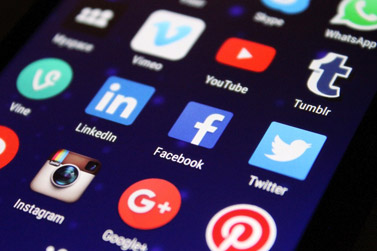
For the most part social media is a great way to stay in touch, share life's high points and give support or get support during the low bits, but we've all heard stories about the misuse of social media and the consequences these misuses can have on our lives.
I’ve put together some simple pointers to help you and yours enjoy social media safely.
1. Pick a suitably complex password and never share it
By this I mean it should be difficult enough that it can’t be guessed by anyone else but easy enough so that you can actually remember what it is. Use a mixture of numbers, capital letters, and special characters - that’s things like @ £ $ ^ & * _ + ! and so on – anything that’s not a letter or number. Some systems won’t let you use full stops, brackets or spaces, though others do. If you are having trouble with this, check the help files for ‘allowable characters’. This will help a lot towards better security. Try not to use a sequence like your birthday or your bank card PIN code though! Don’t use the same password for every social media account you have. It’s also a good idea to change your passwords regularly.
2. Only post if you don’t mind who sees what you post
If you wouldn't want your partner, parent or employer, or for that matter future partner, employer or your children to read or see what you have posted on social media, the best way is not to post it at all - EVER. These are public forums and that means they are viewable by anybody. Even if that person is not your friend on which ever platform you are using, it can still be put in front of their eyes whether it be second, third, or fourth hand. Once you put something online, whether it was a passionate rant at time you were upset or a drunken picture of a night out, it is very difficult (best to regard it as impossible) to remove once its out there.
3. Take time to go through the security settings
Whatever platform you're using, it doesn't take long and can go a long way toward helping you enjoy your experience. If you’re not sure how to do this, check the help files of your social media platform and if they leave you none-the-wiser, you could search for a YouTube tutorial or give me a call.
4. Be wary of sensitive information
Think twice before you put your address or your date of birth on your social media pages. This is information that can be used to trace you, by ANYONE. Think twice about any information that might be sensitive about your family too… children’s dates of birth, where they were born, what school they go to, can all be used to trace you and your family.
5. Don't associate yourself with just anybody trying to connect to you
If someone tries to add you as a friend or colleague and you don’t already know them, ignore or delete the request. Be careful about online profiles, not everyone online is who they say they are. If you don't know them in real life you probably won't want to know them online, it’s as simple as that.
6. Don’t give advance warning or notice of your holidays online
Announcing to the world that you’re away on holiday by posting a cute family selfie and a caption such as "Having great fun on my week away in France," is just telling everybody your house is unoccupied and inviting them to come and burgle you. That said, we do actually want to see your family photos from your week in France - it's just probably best and safest to post them on your return, with captions like "look what fun we had in France last week." Also at this point, it’s worth mentioning that you should check the settings on your smartphone because it can broadcast your location when posting from it. Check for ‘location settings’.
7. When using Internet cafes or any other device you don’t own…
There is usually a tick box when you log in to your social media account that says ‘Remember me’ or ‘Keep me logged in’ or Remember my password’ and so on. Make sure that you un-tick this box and that you log-off your account completely when you are finished what you are doing. Never leave yourself logged in because anyone coming to the computer or device after you can then access your account and all your details.
8. Removing accounts post-mortem
It’s always a good idea to safely leave access to your social media accounts, in the event of your death, so that loved ones can login in and close the account if they wish to. Social media administration are usually unwilling to remove accounts even with a death certificate.
9. Remember it's called social media not anti-social media
If you're being shown comments or images you don't like, unfollow yourself from the account posting them just as you would if someone was being loud or crude in public. This means ‘unlike’-ing or deleting them, not just the post that you find offensive, but the entire account.
Social media is here to stay and is being used in more and more inventive and diverse ways. It can be great fun, informative or just a good way to kill five minutes, so have fun and keep you and yours safe while online.
How To Be Social Media Savvy - written by Ben Hemp and Freelance Writer Ruth Raymer.

 RSS Feed
RSS Feed


